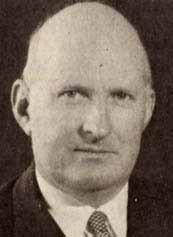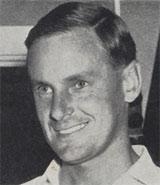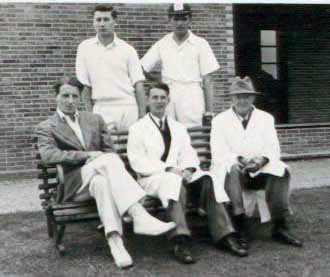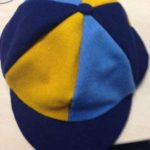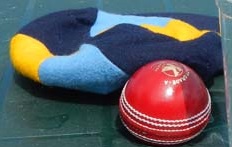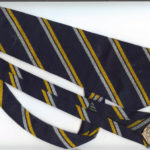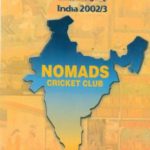The Nomads FIFTY YEARS AGO
David Morton remembers in 2002
Fifty years ago the Nomads often fielded very powerful sides, including players of national and international fame. P.B.H May played while still up at Cambridge, ‘Gerry’ Alexander, captain of West Indies and a test match wicket-keeper, once saved the day with a splendid century at the fag-end of a very hot Cambridge week, when most of the Nomads were too weary and exhausted to do much more than applaud his prowess. S.Singh (Cambridge U. and Warwickshire), unmistakable in his pale blue turban, was an all-rounder who, for a time was on the fringes of the Indian test side. ‘Monkey’ Cameron (Cambridge U. Somerset and West Indies) bowled all types of spin. C.S. Smith (Cambridge U. and Lancashire) was a fast right-arm bowler and Gareth Cryws-Williams, a left-arm back-of-the-hand expert, played regularly for Lincolnshire and had at least one first-class match for M.C.C. Then there were such fine batsmen as Pat Meen, Martin Reynolds (an Oxford Authentic) and Tom Chamberlain, a most awkward and ungainly looking player, who nevertheless in one match after another would poke and prod his way to a big score. Another in the same mould was David Harrison, hard to get out, and imperturbable even when, having snicked the ball onto his leg stump without disturbing the bails, the deflection undeservedly carried to the boundary. Wisden, in the Bryanston School report, records that he ‘played some resolute innings’. He was a glutton for statistics and worked out his batting and bowling averages and even the length of each innings, at the conclusion of every match, entering the figures, in various coloured inks, in an impressive ledger. His brother, a Cambridge Crusader, was more orthodox. Roy Wright, a bottom-handed player, nevertheless scored freely and was a swing-bowler of high quality as well as an outstanding squash player. An Oxford soccer blue, he played centre-forward for Wolves in the days when amateurs still appeared in league football. Most memorable of all was the great ‘Granny’ Alston who had played for Somerset and dismissed Jack Hobbs at the Oval. Originally, a fast bowler for Cheltenham and a tail-end bat, he hit a six into the Old Tavern enclosure against Haileybury at Lord’s, rather enjoyed the experience, and from that moment on his batting flowered. On the rare occasions when he failed to make at least fifty – more often it was seventy-plus – there was panic in the dressing-room as players rushed about collecting the bats, pads and gloves they had supposed they would not have to use. In later years, ‘Granny’ was an off-spinner of impeccable accuracy and immense quile. He soon detected the weaknesses of any opposing batsman. Anyone with an open stance who played across the line delighted him. No-one will forget his immediate ‘Right, take that short-leg away, give me two slips and a gully and I’m going round the wicket.’ Not seldom was the outcome a catch in the designated area. ‘Granny’ was a type not so uncommon in those days. His entire life was built around cricket and at least once he changed his job because, as a travelling representative, he would be able to play in a number of attractiive M.C.C. matches in the north of England, which were out of reach on his existing circuit. He always went on the annual Sou’-westers tour and was also an excellent real tennis player. Physically he was built on the same generous proportions as W.G. Grace and stood, a majestic figure, in the gully, following, with a token movement of the hand and head, the balls which flashed past him to the boundary. Seldom did his capacious hands manage to hold a catch. A perfunctory ‘Sorry, boy. Can’t see ‘em now’ was the only apology the disappointed bowler was likely to receive. On one occasion ‘Granny’ was fielding at short-leg (of all places) to the bowling of Colin Owen-Browne and sure enough, soon dropped a fairly easy catch. There came the inevitable ‘Sorry, boy, can’t see’em, can’t see ‘em’ followed by a careless and inaccurate lob which deposited the ball at the bowler’s feet and made him stood to pick it up. Owen-Browne was furious and completed the over by standing at the wicket and bowling four slow-full-tosses in succession, each of which was hurtling past the bemused ‘Granny’s devoted head on its way to the boundary. The name of Duleepsinghji is hallowed in cricket mystique and tradition, hardly less than that of his uncle ‘Ranji’. ‘Duleep’ toured the Channel Islands with the Nomads in the twenties and left an indelible impression. The Nomads did not return until 1958 and the expedition was an unmitigated disaster. The night-crossing was choppy and the recovery of the afflicted parties next morning was not expected by the spectacle of John Bowell (Commander, R.N.) healthily pink with piercing blue eyes, ordering ‘Bacon, eggs, two sausages, tomatoes and yes, plenty of fried bread too,’ or by his subsequent assurance that the sea had been ‘as calm as a mill-pond.’ On landing, worse was to fall. The Exploits of ‘Duleep’ had not been forgotten and we were treated to the alarming compliment of seeing our arrival heralded on all the local newspaper placards.’ The Nomads Are Back!’ Admiring members of the public watched the initial net-practice and even a press photographer made his appearance. Some seeds of doubt must have been sown, for we were, to say the least, a distinctly average side compared to that earlier party. Perhaps mercifully, our faces were more or less saved by the interposition of the elements; for during the next nine or ten days the weather in the Channel Islands was the worst in living memeory. Only about two days cricket, and that mostly in fits and starts, was possible in Guernsey; in Jersey, not a ball was bowled at all. The one fine day, when the sun shone down from a cloudless sky, was occupied in crossing from one island to another. As if all this were not enough, there had been some muddle over the hotel bookings and half of us were transferred to what was politely but misleadingly termed ‘the annexe’. The ‘annexe’ was only partly through the process of construction and was devoid of baths, hot water and most articles of furniture. The walls, floors and staircases alike confronted the unwilling guest with stark expanses of concrete and the inviting iron bedsteads were equipped with blankets unmistakably of the sort issued to H.M. forces. And all the time the rain descended relentlessly like something produced by the effects department for the gloomier type of television play. The Nomads have not returned to the Channel Islands since. The fixture list looked very different in those days. The club played every regiment in the Household Brigade, several well-known schools and Naval Command on the splendid ground on top of the chalk cliffs overlooking Chatham. The Nomads had easily the longest fixture list of any of the wandering clubs except possibly the Incogniti. Mid-week matches were common enough – employers were more easy-going in those days – and there were times when the Nomads fielded two sides on the same day. There was seldom any shortage of players. There must have been at least a hundred who could be called upon, most residing in the home counties, but not a few living much further afield who appeared regularly on the tours. There were two each year – three days at Oxford during the Whitsun weekend and a nine-day visit to Cambridge during the long Vac term in August when the colleges were at least half-full, scientists pursuing their mysterious occupations in the labs, and other men coming up under pretence of some extra reading for the cricket, punting and social life. It was from these two universities that the greater part of the membership was then drawn, those who were neither dark nor light blue belonging almost entirely to the service or the medical profession. Accommodation at Cambridge was provided in one of the Clare lodging houses run by dear old Mrs Lawry, inevitably known as Annie. For her, Cambridge was not just the only university, but almost the only place in the world. In those days it cost six pounds a week with an enormous breakfast and a salad meal in the evening thrown in. The dining-room with mahogany table and sideboard of battle-ship dimensions, was crowded with photographs of Clare men, many in First World War uniform, of whom too high a proportion probably never saw Cambridge and Annie Lawry again. The building must have had some mysterious capacity for indefinite expansion, for along with the Nomads, the 1st XI of Newcastle Royal Grammar School always visited Cambridge at the same time. Add to them a floating population of Asian tourists or students who seemed to reside permanently in the bathrooms; but the Nomads were in no position to complain. What with drinking into the early hours – huge crates of Tolly ale were imported when the pubs closed – and practising golf and cricket strokes down the long hall at midnight, it was a wonder that even the tolerant Annie was prepared to put up with us. The Pickerel opposite Magdalene was almost our off-duty headquarters, while the Little Rose, the Blue Boar and the Baron of Beef were as familiar to us as the college grounds, but in one crisis we were obliged to include not merely these, but practically every pub in Cambridge. As a result of some dire confusion regarding fixtures the ground of our opponents for the following day was unavailable. Accordingly, we were one and all despatched on a bitulous circuit of the town to round up any cricketers lurking on licensed premises who might be cajoled into playing against us on any other ground that happened to be free. To such effect and with such enthusiasm was this done, that when the situation was reviewed later that night, it transpired that we were contracted to meet seventeen players simultaneously on two different grounds. David Harris, darkly-handsome and always immaculately dressed was a great stylist who had won his colours at Trinity and during the Cambridge week lived life to the full. After a match, he was in the habit of roaring up to London in his powerful sports car to visit a night-club, roaring back again well after midnight and then playing bridge until four or five in the morning. Such a regime was not exactly calculated to guarantee sustained success on the field of play, as his scores one August exemplified only too well. On the first day, he scored a brilliant century; on the second, a steady fifty; on the third, a somewhat uneasy thirty, mostly off the edge; and after that, it is doubtful if he reached double figures during the remainder of his stay. One Oxford weekend told a similar story. In 1956, the club scored 260 for five wickets against Balliol on the Saturday. On Sunday, against Magdalen, a rather more deliberate and contemplative 200 was reached with nine wickets down ; and on Monday, against St.John’s, the side was all out for thirty-five, a pretty clear indication of how the majority had spent the previous three evenings. The father-figure, Grey Eminence and guiding light of the club was the renowned Sidney Caulfield. A small, almost wizened figure, he had a little beak of a nose and his flat head and wrinkled brow poked forth from his shoulders like a benevolent tortoise. No matter how hot the weather, he invariably wore a heavy grey tweed suit with a deerstalker of the same material, a Nomads tie, and he preferred boots to shoes. He was reputed to be an eminent architect, but as far as could be ascertained, his office served as the Nomads’ administrative headquarters and his staff devoted the major part of their time to the arrangement and confirmation of fixtures, the notification and replacement of players and the revision of membership lists. None of his contemporaries was available to vouch for his form as a player, but it transpired that he had once opened the bowling for the M.C.C., and though this is less of a distinction that might be supposed, it does imply a standard at least reasonable. His status as a player could easily have been superior to that which he enjoyed as an umpire; those who complain about last week’s official would quickly have learned, when Sidney was standing, what bad decisions really meant. Sidney was blind in one eye though no-one knew it, but insisted on umpiring in every Nomads’ game, with the predictable consequences. Finally, he was seriously urged to resort to spectacles. The suggestion bore unexpected fruit, for in due course Sidney emerged from the pavilion equipped with a pair of those binoculars which hook over the ears like ordinary glasses and used to be advertised in the press as ‘excellent for the theatre, opera and race-meetings’. With this contraption in place, Sidney, when at the bowler’s end, was reduced to standing with his back practically touching the sight-screen in order to bring the far wicket into focus; and when ‘over’ was called, he assumed a position on the boundary in the immediate vicinity of very deep square-leg. Such prolonged manoeuvring did little to facilitate a rapid change-over and the unimpeded progress of the game. The passage of time was not apparently conducive to any improvement in Sidney’s organisational powers. One visit to Cambridge was marked by successive mishaps. To begin with, we were one room short at the hotel. Then it was discovered that we were twelve players strong for the next day’s match. Sidney rang up the college. ‘Can you make it twelve?’ They thought he referred to the time of start and declined. So he told one man to go and play golf. Having arrived at the ground, and too late to recall the golfer, we mustered only ten, the eleventh man who, according to Sidney, was travelling up from Gloucestershire that day, having altogether failed to appear. ‘Such a reliable man,’ said Signey, adding, with an imperturbable complacency worthy of Lewis Carrol’s White King, ‘ he must certainly have met with some serious accident.’ It was on the final day of a Cambridge week that Sidney was the victim of a sickening accident. He had on this occasion abandoned the opera glasses for ordinary spectacles, though it was strongly suspected that the lenses had not been updated for years and were in any case more suitable for reading. The ball was played down to fine third man for what would in any case have been a simple, but was slightly misfielded and the batsmen went for a second run. Third man threw in violently and much too wide for the wicket-keeper to incercept the ball, which arrived at the bowler’s end on an enormous skipping long-hop which ricocheted off the stumps and into Sidney’s face, he as usual having remained rooted to the spot, being either too decrepit or too idle ever to move away square to the wicket into a position where he could judge a run-out . Blood splattered over stumps, grass and white coat as the glass of Sidney’s spectacles shattered and fragments were embedded, with tragic inevitability, in his good eye, thus rendering him effectively almost totally blind. He was rushed to the Addenbrooke hospital, imperturbably as ever, his lofty serenity undisturbed and that evening was keeping the entire ward entertained with anecdotes of the more hilarious passages in the Nomads’ history. A delegation of authority was clearly essential, for Sidney would obviously be unable to discharge his usual functions for weeks or even months ahead. Most of the men had departed for their homes on the night of the accident, and it was on my unworthy self that the mantle descended when I called at the hospital next morning. Sidney’s famous ‘Little Black Book’, the inside of which no-one had ever been allowed to see, but according to rumour contained the only thoroughly comprehensive membership list in existence, was placed in my trembling hands with instructions to maintain close contact with the match managers and generally to oversee the proceedings until such time, if ever, that he was fit to resume control. I soon discovered another rumour to be true, namely, that the list was heavily annotated with comments, not only on each player’s priority as batsman or bowler, whether he was fast right on slow left, his capabilities or lack of them in these directions, but in some cases his moral and intellectual qualities as well. Thus Michael Carr, a Crusader, was designated as ‘batsman-wicket-keeper, very good; another was acidly described as ‘not so good as he thinks’ and one unfortunate was peremptorily dismissed with the warning ‘Not to be trusted with anything of importance’. It may readily be guessed with what altercations of hope and fear I nervously thumbed through the pages until I reached the M Section. There, sure enough, was my name, with the usual details of address and telephone number; but the space left for further comments, flattering or otherwise, remained as blank as on the day the article had been purchased, an ominous silence attributable only to the fact that, in my case, Sidney had been totally at a loss for words. It is pleasant to conclude the story of Sidney’s misfortunate with a reasonably happy ending. The surgeons were able to remove the cataract from the hitherto blind eye, so that he was restored to his Erstwhile Cyclopaen state; and I am glad to report that though he never ‘stood’ again, we saw our old friend at many more Nomads matches until the ‘ever-rolling stream’ exerted its usual melancholy effect. The whole membership, past, present and future, owes an immense debt to Sidney Caulfield. David Morton was a prep school schoolmaster and opening batsman. He played his cricket when not for Nomads for Northwood CC, Middlesex and thereafter was a stalwart of ‘The Hill’ CC – with an enduring capacity for Fuller’s ales-London-Pride and ESB. He first played for Nomads on a Cambridge Tour in 1952 and is responsible for introducing Michael Blumberg to the club in a match at Merrow in 1973. “Nomads are two short for tomorrow’s game at Merrow” he declared in the Northwood pavilion quite late one Saturday evening and so Blumberg and Neil Burggy ‘volunteered’. The rest is history as they say. David attended every Nomads dinner. His last was that of 2004. Always he wore his Nomads Tie. Ranjit Latchman informed us while on tour in Spain March 2009 that David had died some months previously. Somehow his executors were unaware of his connection with Nomads so sadly and regretably the Club missed his funeral. Subsequent conversations with his executors produced no Nomads memorabilia at all. He had been one of the few members who owned and wore a Nomads tie. This article originally appeared in the Nomads Centenary Tour to India Brochure.



